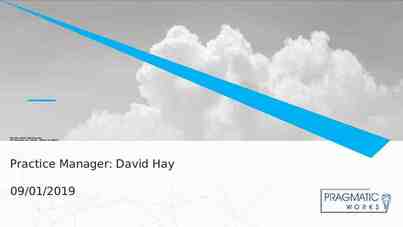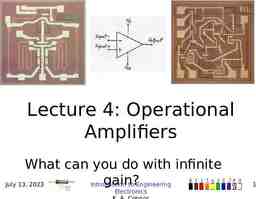UNCLASSIFIED US Special Operations Command Source Selection
36 Slides1.38 MB

UNCLASSIFIED US Special Operations Command Source Selection and Evaluation Briefer: Raisa Barnes Office: SORDAC-KX Date: 1 May 2013 1 UNCLASSIFIED

UNCLASSIFIED Agenda Types of Source Selections Source Selection Process/Government’s Responsibility Source Selection Teams Solicitation/Request for Proposal (RFP) Proposal Submission and Evaluation Criteria Evaluation and Decision Process UNCLASSIFIED 2

UNCLASSIFIED Exchanges with Industry Before receipt of proposals Industry conferences Public hearings Market research Pre-solicitation notices Draft RFPs Site visits UNCLASSIFIED 3

UNCLASSIFIED Source Selection Approaches Two common types: Lowest price technically acceptable (FAR 15.101-2 ) – Best value is expected to result from selection of a technically acceptable proposal with the lowest evaluated price Trade-off Process (FAR 15.101-1) – In the best interest of the Government to consider award to other than the lowest priced offeror or other than the highest technically rated offeror – All evaluation factors and significant subfactors that will affect contract award and their relative importance shall be clearly stated – Possible Trade-offs: Technical, Past Performance, and Price/Cost UNCLASSIFIED 4

UNCLASSIFIED Source Selection Process Receive procurement request package Develop the acquisition strategy/plan Prepare and issue the solicitation Receive proposals Conduct initial proposal evaluation Understandin Establish competitive range g the whole Conduct “meaningful” discussions Request final proposal revision process Conduct final proposal evaluation before you Source selection decision begin is Award critical. Debrief unsuccessful offerors DoD Source Selection Procedures Guide: http://www.acq.osd.mil/dpap/policy/policyvault/USA007183-10-DPAP.pdf UNCLASSIFIED 5

UNCLASSIFIED Acquisition Planning Government’s Responsibility: Identify the requirement Determine how a successful offeror will be selected Determine the criteria used to measure the merit of the proposal Identify important discriminating factors & subfactors Identify the level of importance for each factor & sub-factor Determine what information the offerors need to submit 6 UNCLASSIFIED 6

UNCLASSIFIED Typical Source Selection Team Source Selection Authority SOURCE SELECTION (SSA) GOV’T ADVISORS CONTRACTING - LEGAL - OTHER ADVISORY COUNCIL SOURCE SELECTION EVALUATION BOARD CHAIRMAN TECHNICAL TEAM UNCLASSIFIED PAST PERFORMANC E TEAM (PRAG) PRICE/ COST TEAM 7

UNCLASSIFIED EVALUATION AND DECISION PROCESS Initial Evaluation Discussions Evaluation Evaluation Factors Factors Offeror Proposals UNCLASSIFIED Go/ Go/ No-Go No-Go EE vv aa ll uu aa tt II oo NN Strengths Deficiencies Significant Weaknesses Weaknesses Uncertainties Ratings Initial SSEB Report Competitive Competitive Range Range Determination Determination (Briefing) (Briefing) Discussions Discussions ENs Final Final Proposal ProposalRevision Revision Evaluation Evaluation Final Evaluation Final SSEB Report Findings Ratings Final Evaluation Best Value Decision (Source Selection Decision Document (SSDD) Award Awardw/o w/o Discussion Discussion Award Award Debriefs 8

UNCLASSIFIED Proposal Information Instructions to Offerors Describes what the Government wants offerors to submit Evaluation Criteria How we’re going to evaluate what offerors submit Section L mirrors the information in Section M. The proposal provides the only information that can be evaluated during the source selection, Government’s knowledge of the offeror cannot be considered or evaluated so make sure you clearly document the data requested in Section L to be evaluated in accordance with Section M 10 UNCLASSIFIED 10

UNCLASSIFIED Factors & Sub-factors Spec QA Know the mpliance o C Test Resu important lt s P’s discriminating P K Factors & Subr factors e Us st Te Know the level of Know what the factors importance and sub-factors are, and for each clearly demonstrate how your technical approach will meet factor & the requirement. Specify sub-factor benefits to Government. UNCLASSIFIED 11 11

UNCLASSIFIED Proposal Instructions Section L TECHNICAL (Area) THINK--What information did the Government Product Samples (Factor) request? Make it clear in Test Results (Sub-factor) your proposal, answer the User Assessment (Sub-factor) Government’s requirement. Specifications (Sub-factor) Technical Approach (Factor) Specification Thresholds/Objectives (Sub-factor) Management (Factor) Quality Assurance (Sub-factor) Section L tells you what you Subcontracting (Sub-factor) must submit. Section M tells the importance of each Facilities (Sub-factor) area, factor and sub-factor is PAST PERFORMANCE (Area) detailed. The Areas/Factors/ PRICE (Area) Sub-factors relative order of UNCLASSIFIED importance must be included in the RFP. 12

UNCLASSIFIED Steps To Take Know the Requirement Know the criteria and standards stated in the RFP Read through the request for proposal - one time in total Read through again and know what the government is looking for, what are the key elements UNCLASSIFIED 13

Proposal Evaluation vs. Source Selection UNCLASSIFIED PROPOSAL EVALUATION Examination of the merits of each proposal against the requirements of the solicitation and rating the factors and sub-factors. Performed by the Source Selection Evaluation Board (SSEB). SOURCE SELECTION Comparing the evaluated merits of each proposal against those of the other proposals, using the established weights of the factors and sub-factors, and selecting the proposal judged to represent the “best value” to the Government. 14 Performed by the Source Selection Authority (SSA). UNCLASSIFIED 14

UNCLASSIFIED General Information for Evaluation Evaluations are consistent with the RFP criteria Government cannot use what they know about the Offeror, it must be included in the Offeror’s proposal Proposals are not evaluated against one another proposals are evaluated against the criteria outlined in Section M Evaluating the offeror’s unique approach to the requirement Government will issue Evaluation Notices (ENs) as the tool to understand discrepancies or obtain clarifications ENs are not providing or developing a solution for the Offeror, they are to obtain additional information ENs are specific to individual concern within an Offeror’s proposal All source selections are governed by the DoD Source Selection Procedures http://www.acq.osd.mil/dpap/policy/policyvault/USA007183-10DPAP.pdf UNCLASSIFIED 15

UNCLASSIFIED Evaluation Methodology TECHNICAL Blue OUTSTANDING PAST PERFORMANCE SUBSTANTIAL CONFIDENCE Purple Green GOOD SATISFACTORY CONFIDENCE LIMITED CONFIDENCE NO CONFIDENCE ACCEPTABLE UNKNOWN CONFIDENCE Yellow MARGINAL Red UNCLASSIFIED UNACCEPTABLE PRICE Total Evaluated Price (TEP) (FFP Contracts) or Most Probable Cost (MPC) (CPFF 16 Contracts/Incentive Contracts)

UNCLASSIFIED Combined Technical/Risk Ratings Color Blue Rating Outstanding Purple Good Green Acceptable Yellow Marginal Red Unacceptable UNCLASSIFIED Description Proposal meets requirements and indicates an exceptional approach and understanding of the requirements. Strengths far outweigh any weaknesses. Risk of unsuccessful performance is very low. Proposal meets requirements and indicates a thorough approach and understanding of the requirements. Proposal contains strengths which outweigh any weaknesses. Risk of unsuccessful performance is low. Proposal meets requirements and indicates an adequate approach and understanding of the requirements. Strengths and weaknesses are offsetting or will have little or no impact on contract performance. Risk of unsuccessful performance is no worse than moderate. Proposal does not clearly meet requirements and has not demonstrated an adequate approach and understanding of the requirements. The proposal has one or more weaknesses which are not offset by strengths. Risk of unsuccessful performance is high. Proposal does not meet requirements and contains one or more deficiencies. Proposal is unawardable. 17

UNCLASSIFIED Evaluating a Technical Proposal UNCLASSIFIED 18

UNCLASSIFIED Technical Technical Team Team Evaluation Evaluation Process Process Tech Team reviews and evaluates, as a whole The technical approach described in the proposal The SOW to ensure that it implements what is described in the proposal The Basis of Estimates (BOEs) to ensure that the hours estimated to implement the approach described in the proposal are adequate to perform the work Review estimating methodology to ensure it’s reasonable The Bill of Materials to ensure that the material types and quantities necessary to execute the approach are included UNCLASSIFIED 19

UNCLASSIFIED Technical Sub-Factor Rating Offerors A B C D SUBFACTORS Product Samples Technical Approach Test Results User Assessment Specifications Spec (T/O) Management Quality Assurance Subcontracting Facilities UNCLASSIFIED 20

UNCLASSIFIED Roll-Up Process TECHNICAL - AREA A B C D L L H H Product Samples - FACTOR L L L L Technical Approach - FACTOR H M M L Management - FACTOR To derive the Technical Area rating, roll-up the factor ratings UNCLASSIFIED 21

UNCLASSIFIED Initial Evaluation Results Offerors A B C D L L H H UNCLASSIFIED TECHNICAL 22

UNCLASSIFIED Past Performance Evaluation The past performance evaluation factor assesses the degree of confidence the Government has in an offeror’s ability to supply products and services that meet users’ needs, based on a demonstrated record of performance Provide recent contracts with similar scope/ requirements Ensure current contacts are provided with name and phone numbers Consider relevant subcontracts UNCLASSIFIED 23

UNCLASSIFIED Past Performance Relevancy Ratings Rating Definition Very Relevant Present/past performance effort involved essentially the same scope and magnitude of effort and complexities this solicitation requires. Relevant Present/past performance effort involved similar scope and magnitude of effort and complexities this solicitation requires. Somewhat Relevant Present/past performance effort involved some of the scope and magnitude of effort and complexities this solicitation requires. Not Relevant Present/past performance effort involved little or none of the scope and magnitude of effort and complexities this solicitation requires. UNCLASSIFIED 24

UNCLASSIFIED Past Performance Confidence Assessments Rating Description Substantial Confidence Based on the offeror’s recent/relevant performance record, the Government has a high expectation that the offeror will successfully perform the required effort. Satisfactory Confidence Based on the offeror’s recent/relevant performance record, the Government has a reasonable expectation that the offeror will successfully perform the required effort. Limited Confidence Based on the offeror’s recent/relevant performance record, the Government has a low expectation that the offeror will successfully perform the required effort. No Confidence Based on the offeror’s recent/relevant performance record, the Government has no expectation that the offeror will be able to successfully perform the required effort. Unknown Confidence (Neutral) No recent/relevant performance record is available or the offeror’s performance record is so sparse that no meaningful confidence assessment rating can be reasonably assigned. UNCLASSIFIED 25

UNCLASSIFIED Initial Evaluation Results Offerors A B C D L L H H Sub UNCLASSIFIED Sat Sat Limited TECHNICAL PAST PERF 26

UNCLASSIFIED Cost/Price Per FAR 15.304(c)(1) price or cost must be evaluated. The level of detail of analysis required will vary among acquisitions depending on the complexity and circumstances of the acquisition, the type of product/services to be acquired, and the contract type. Every solicitation should provide a description of the cost or price evaluation. The main purpose of the price evaluation is to determine a Fair, Reasonable, and Realistic price. Reasonableness: Usually determined through competition; represents the price a prudent person would pay for an item or service under competitive market conditions Realism: Cost type contracts, probable cost adjustments required. Linked to technical/risk rating, other Government costs, etc. FAR Subpart 15.4 and the Contract Pricing Reference Guides ( http://www.acq.osd.mil/dpap/cpf/contract pricing reference guides. html ) provide additional guidance on cost or price evaluation. UNCLASSIFIED 27

UNCLASSIFIED What’s The Price? Cost contracts Govt. creates a Total Evaluated Price based on the Most Probable Cost (MPC) of the Offeror by making adjustments where necessary (i.e., direct and indirect rates, labor hours, material, etc.). This helps to prevent the Gov’t from making a selection based on an unrealistic estimate and insures offeror understands the requirement). For FFP contracts the TEP is the Offeror’s price Government will not adjust the TEP If the price quoted appears unrealistically low, it may influence performance risk rating and reflect a lack of understanding of Coordination between Technical Team and Cost/Price Team is critical to the requirement ensure that the Technical Volume is in line with the Cost/Price Volume (i.e., Price is representative of the technical approach). ADVICE: Show all detailed calculations. Excel spreadsheets should be submitted with all formulas and links included. How did you arrive at your price? Price/Cost Volumes do not have page limits, explain your basis of estimate. UNCLASSIFIED 28
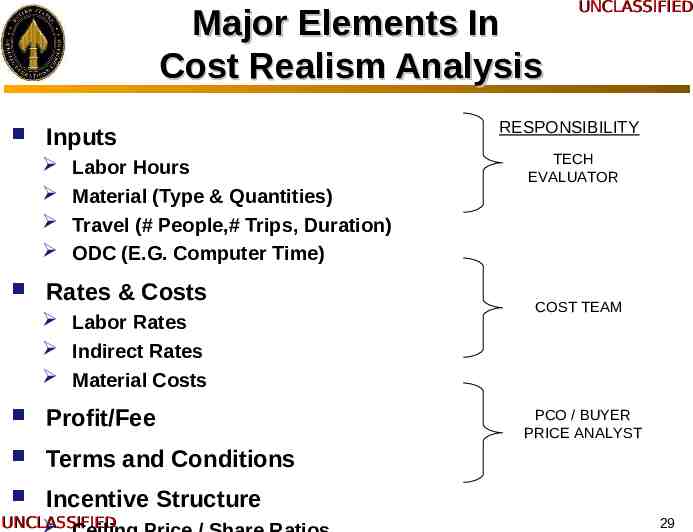
Major Elements In Cost Realism Analysis Inputs Labor Hours Material (Type & Quantities) Travel (# People,# Trips, Duration) ODC (E.G. Computer Time) Rates & Costs Labor Rates Indirect Rates Material Costs Profit/Fee Terms and Conditions Incentive Structure UNCLASSIFIED UNCLASSIFIED RESPONSIBILITY TECH EVALUATOR COST TEAM PCO / BUYER PRICE ANALYST 29

UNCLASSIFIED Cost/Price Cost/Price Team Team Cost Team Responsibilities: Verifying Rates and Factors Checking the cost proposal for completeness Understanding pricing assumptions that may affect cost/ price Coordination with Technical Team to ensure consistency between Technical Volume and Cost/Price Volume Coordination between Technical Team and Cost/Price Team is critical to ensure that the Technical Volume is in line with the Cost/Price Volume (i.e., Price is representative of the technical approach) UNCLASSIFIED 30

UNCLASSIFIED Cost/Price Realism Assessment Methodology Criteria: Cost proposals evaluated for: Consistency with technical proposals Clear understanding of solicitation requirements Sound approach to satisfying these requirements Methodology: Labor and ODC evaluated for realism in relation to RFP and offeror ‘s unique approach Cost impact of Technical/Management risks assessed Costs adjusted to eliminate competitive advantage from proposed use of Gov’t property or facilities Most Probable Cost (MPC) developed for each offeror’s proposal Technique: Comparison to program cost estimate, analogous programs, parametric models (SEER-SEM), historical databases, and SSEB engineering assessments UNCLASSIFIED 31
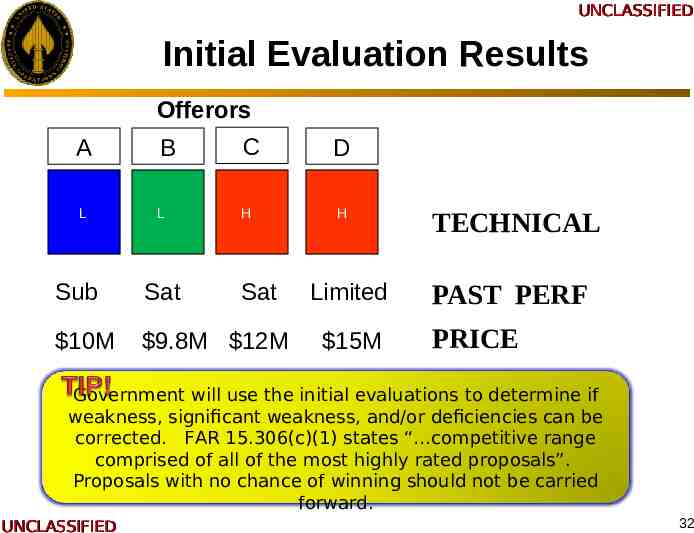
UNCLASSIFIED Initial Evaluation Results Offerors A B C D L L H H Sub Sat Sat 10M 9.8M 12M Limited 15M TECHNICAL PAST PERF PRICE Government will use the initial evaluations to determine if weakness, significant weakness, and/or deficiencies can be corrected. FAR 15.306(c)(1) states “ competitive range comprised of all of the most highly rated proposals”. Proposals with no chance of winning should not be carried forward. UNCLASSIFIED 32
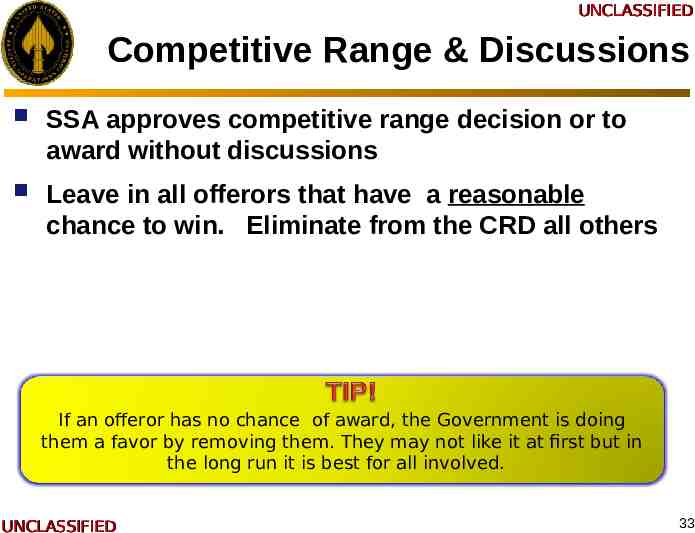
UNCLASSIFIED Competitive Range & Discussions SSA approves competitive range decision or to award without discussions Leave in all offerors that have a reasonable chance to win. Eliminate from the CRD all others If an offeror has no chance of award, the Government is doing them a favor by removing them. They may not like it at first but in the long run it is best for all involved. UNCLASSIFIED 33
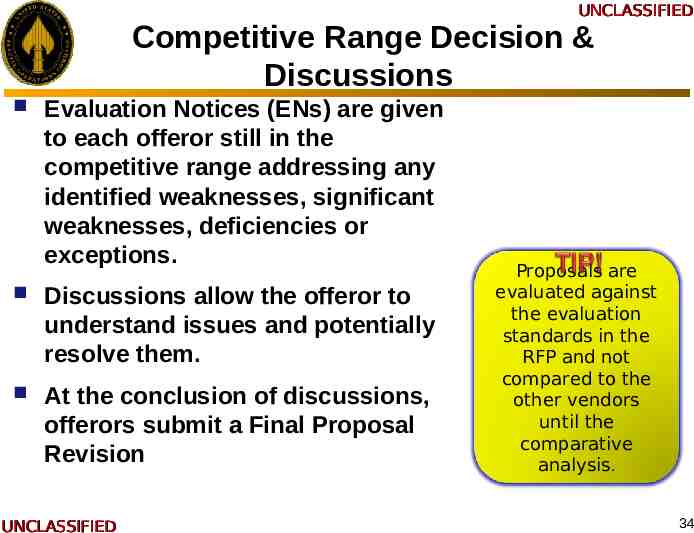
UNCLASSIFIED Competitive Range Decision & Discussions Evaluation Notices (ENs) are given to each offeror still in the competitive range addressing any identified weaknesses, significant weaknesses, deficiencies or exceptions. Discussions allow the offeror to understand issues and potentially resolve them. At the conclusion of discussions, offerors submit a Final Proposal Revision UNCLASSIFIED Proposals are evaluated against the evaluation standards in the RFP and not compared to the other vendors until the comparative analysis. 34
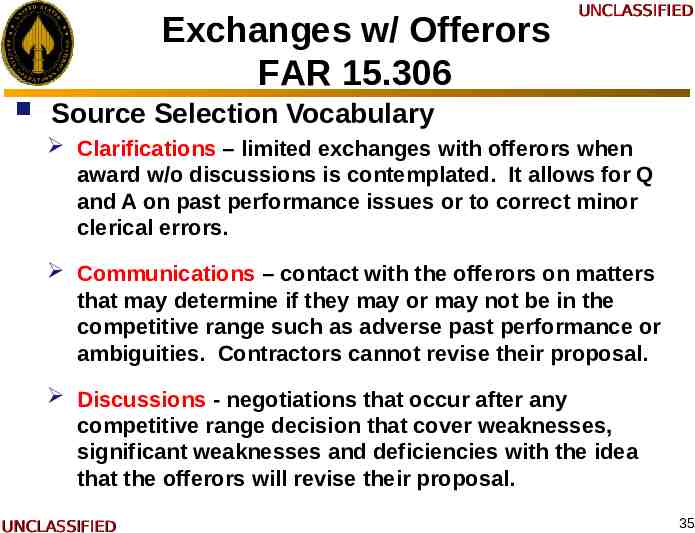
Exchanges w/ Offerors FAR 15.306 UNCLASSIFIED Source Selection Vocabulary Clarifications – limited exchanges with offerors when award w/o discussions is contemplated. It allows for Q and A on past performance issues or to correct minor clerical errors. Communications – contact with the offerors on matters that may determine if they may or may not be in the competitive range such as adverse past performance or ambiguities. Contractors cannot revise their proposal. Discussions - negotiations that occur after any competitive range decision that cover weaknesses, significant weaknesses and deficiencies with the idea that the offerors will revise their proposal. UNCLASSIFIED 35
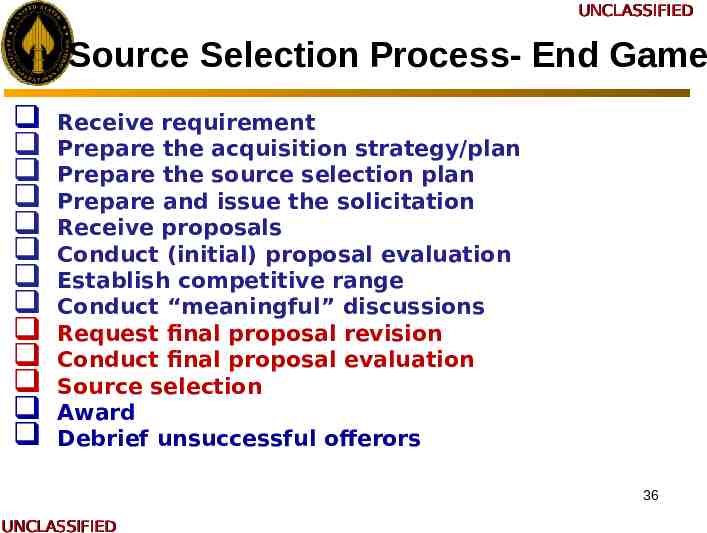
UNCLASSIFIED Source Selection Process- End Game Receive requirement Prepare the acquisition strategy/plan Prepare the source selection plan Prepare and issue the solicitation Receive proposals Conduct (initial) proposal evaluation Establish competitive range Conduct “meaningful” discussions Request final proposal revision Conduct final proposal evaluation Source selection Award Debrief unsuccessful offerors 36 UNCLASSIFIED
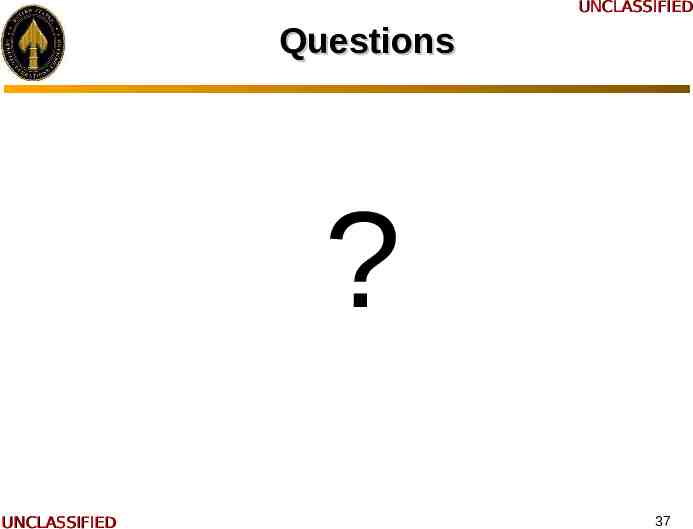
UNCLASSIFIED Questions ? UNCLASSIFIED 37


